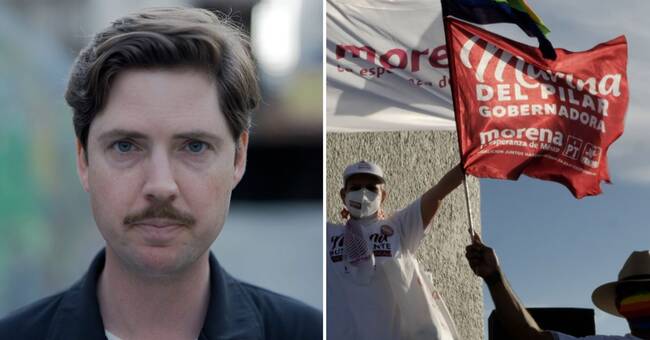When he was elected, López promised Obrador to eradicate corruption in Mexico and thus dismantle the "la mafia del poder" - the power mafia - which he believes has ruled the country at the expense of ordinary people.
A peer capitalism where close contacts between political power holders and business leaders was the key to big money.
But López Obrador's first time in power did not turn out to be the great transformation that some had hoped for and others feared.
Difficult to place on the right-left scale
López Obrador is often described as a left-wing politician.
But the truth is that the Mexican president is not easy to place on a traditional political scale.
As for economic policy, he has a typical leftist rhetoric that pits a corrupt power elite against the Mexican people.
But at the same time, he is very careful with fiscal policy and has put savings before investments.
López Obrador also describes himself as a Christian and has clear conservative features - for example, to the great disappointment of the rapidly growing feminist movement, he has refused to take a stand on politically charged moral issues such as abortion.
And López Obrador had his nationalist appearance despite a surprisingly good relationship with Donald Trump.
Militarization continues
A major failure for the president has been security, where the violence of the drug cartels continues to plague Mexico.
During his election campaign, López promised Obrador to break with the militaristic line of his predecessors and instead focus on the underlying reasons why new young people are constantly being drawn into organized crime.
But once in power, López Obrador chose to keep the military on the streets under the leadership of a newly formed National Guard.
And the violence has remained at record levels.
2019 was the most violent year in Mexico's modern history and during the pandemic year 2020, violence decreased only marginally.
The president is investing in an oil refinery
Another area where there is a great shortage of new ideas is energy policy.
López Obrador has chosen to invest in a criticized construction of a new oil refinery instead of focusing on developing Mexico's enormous potential for renewables - not least solar energy.
Given the mixed results so far to say the least - how come the governing party Morena is still the big favorite in the midterm elections?
Well, it's above all about the Mexican opposition's inability to self-criticism and renewal.
For many Mexicans, it is unthinkable to vote for the traditional parties that have ruled the country for decades and are seen as responsible for the major societal problems.
And the fact that the former mortal enemies PRI and PAN have now entered into an alliance to try to stop López Obrador makes their credibility even less.
The biggest choice in Mexico's history
During Sunday's election, 21,000 elected officials are at stake - the largest election in Mexico's history. These are members of Congress, governors, mayors and representatives of municipal councils. The president's own party, Morena, is the big favorite to get a majority in Congress. The question is how big the election victory will be and whether it will be enough for a qualified majority, which is required to push through changes to the constitution. Critics warn that Mexico could move in an authoritarian direction if too much power is concentrated in the hands of a party, pointing to how the president uses his daily press conferences to attack the media and civil society.
Although the big changes have not taken place since López Obrador came to power, the president represents a new way of conducting politics - with direct address and where many poor Mexicans for the first time feel that a president knows their reality and takes it seriously. And the small means a lot in a country where many citizens had completely given up hope of politics.

